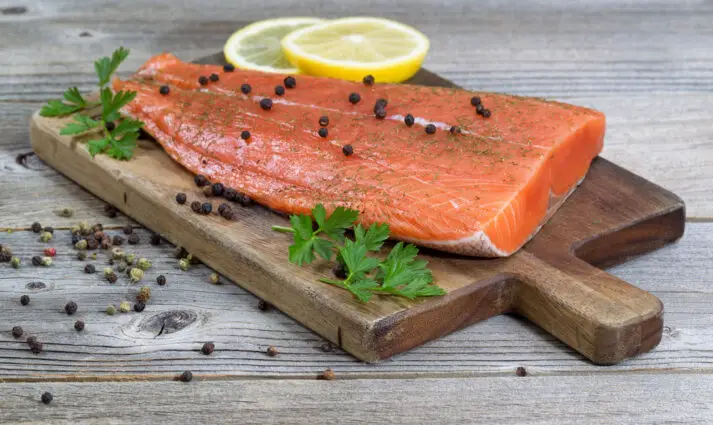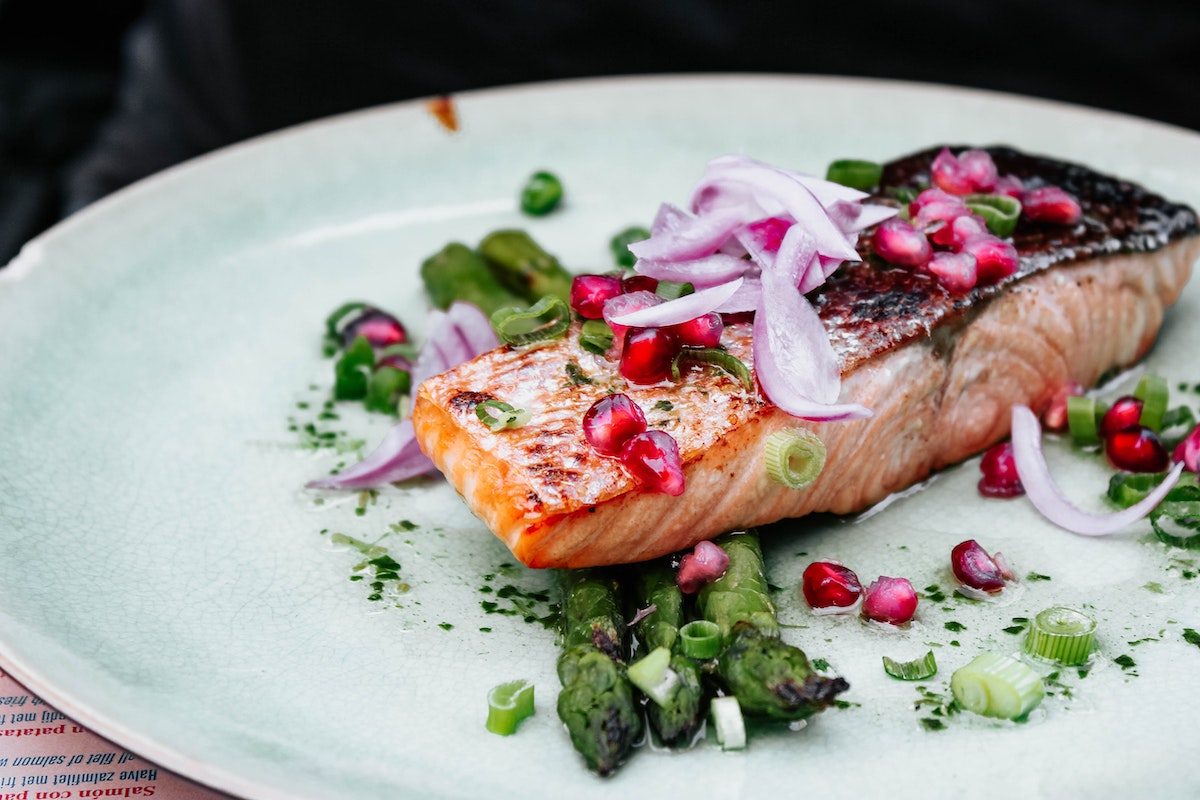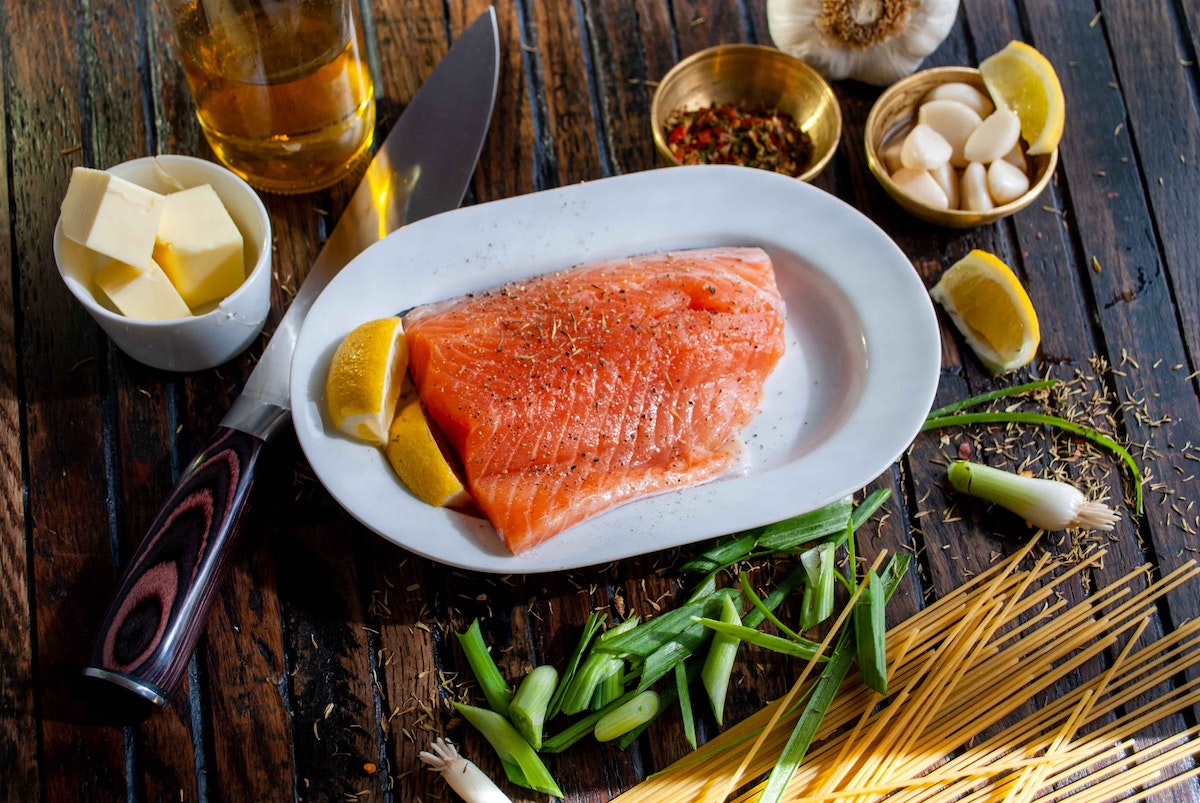Nominated-Day or Next-Day
Nominated-Day or Next-Day

For smaller cuts like fillets, a marinate the salmon 30 minutes to 1 hour, while larger filets may require up to 2 hours. Avoid marinating salmon beyond 24 hours, as this may lead to protein degradation and a mushy texture. For acid-based marinades, limit the marination time to a maximum of 6 hours.
Salmon, like other fish varieties, is no exception. It can easily be overcooked in a matter of minutes. Marinating your salmon before cooking not only prevents it from drying out but also adds moisture and enhances its flavor.
The best length of time to marinate salmon depends on the size of your fish, the ingredients in the marinade, and the desired flavor affinity.
In this article, we delve into the world of marinades! We’ll explore various marinade flavors to choose from and examine how they influence the cooking process. By understanding the nuances of marination, you can unlock the full potential of your salmon dish, ensuring tender and flavorful results every time.
Marinating food is not an exact science, as each type of meat or plant varies. However, there are guidelines that can help ensure success.
The main factor affecting salmon marination time is the size of the fish. Larger pieces require more time to marinate thoroughly, while smaller portions need less time.

Marinating aims to tenderize meat, and ingredients like acids, salts, dairy products, and certain fruit enzymes can speed up the process. If your marinade lacks these components, you may need to marinate longer, possibly up to 50% more (e.g., 45 minutes instead of 30).
An abundance of these ingredients in your marinade can cause an undesired outcome by drawing out moisture and making the salmon tough and dry.
When deciding how long to marinate your salmon, consider the desired flavor intensity. Some marinades and ingredients take longer to penetrate the meat, so you might need to extend the marination time and take notes for future reference.
If you’re uncertain about the timing, follow the marinade recipe’s instructions, and you should achieve satisfactory results!
Over-marinating salmon is possible. As I mentioned previously, marinating salmon in an acid or salt-based marinade for too long can result in a tough and dry piece of fish.
Beyond the 24-hour mark or even earlier, the salt and acidic ingredients may start to remove the moisture they initially added. If the marination process continues, the acid may break down the fish’s proteins, causing it to become soft and mushy.
As discussed earlier, you can marinate your salmon for 30 minutes to 6 hours, depending on the size of the fish, desired flavor intensity, and marinade ingredients.
After marinating, cook the salmon within an hour of rinsing or wiping it clean. Delaying cooking may lead to over-marinated fish with an undesirable texture.
If you’re seasoning your salmon with salt or a dry rub, you can choose to let the seasoning sit with the fish for a short time or cook it immediately. Keep in mind that dry seasonings can draw out moisture, so avoid leaving them on the fish for too long. Always store marinated fish in the refrigerator until ready to cook.
It is crucial to store marinating salmon in the refrigerator no matter what! Some people believe that marinades work faster at room temperature, but unlike other meats, fish requires different storage conditions.
Refrigerate marinated fish for up to 24 hours. However, remember that you shouldn’t marinate fish for any longer than 24 hours, especially if it’s a smaller piece with an acidic and salty marinade.
Can you put marinated salmon in the freezer? Yes, you can. Place the marinated salmon in an airtight container or bag, seal it, and freeze it immediately. To ensure its best quality, use it within 3-8 months, per USDA.
Over the years, salmon has gained popularity and is now one of the most cherished fish species worldwide.
Almost every culture (particularly those near coastal regions) features some salmon-based dishes.
Salmon is not only renowned for its delicious taste but also for its numerous health benefits. It is incredibly rich in omega-3 fatty acids (commonly referred to as healthy fats) and protein.
There are two primary types of salmon: wild and farmed. Numerous varieties exist within both categories. Some species are found globally, and each region utilizes the species most readily available to them.
Popular species used for culinary purposes include Norwegian salmon, Sockeye (red) salmon, and Atlantic salmon, among other lesser-known varieties.
Salmon is often mistaken for trout when comparing their flesh, as both typically exhibit bright, coral-pink hues. However, they are quite distinct.
Before choosing a recipe, select your salmon piece. One tip when selecting salmon is to consider the color. The darker or deeper the hue (red or pink), the more flavorful and firm the flesh will be. However, red varieties are rarer than white or pink ones.
Choose a fish piece free of blemishes, discoloration, and most importantly, odor.

After marinating, your salmon is ready for cooking. Salmon can be prepared using various techniques, such as pan-frying, baking, poaching, grilling, or air-frying.
Before cooking marinated salmon, decide whether to remove the marinade. You can follow your recipe’s instructions or adhere to a general rule of thumb.
For grilling or searing salmon on a griddle or in a pan, it’s best to remove excess marinade but not wash or scrub it off. For baking, you can either keep the marinade in the baking dish or remove it before cooking.
If you’re unsure and your recipe doesn’t specify, remove any loose marinade.
Here are popular methods for cooking marinated salmon:
Read also: The Correct Temperature To Cook Salmon
These methods ensure tender, succulent, and delicious salmon every time.
Marinating food is a more traditional cooking technique than you might think and is employed to enhance flavor.
Marinating a piece of meat or vegetable helps soften and tenderize the product. This method is particularly beneficial for meats, as they tend to become dry and tough during cooking.
Marinating also adds moisture to the fish, helping to prevent it from drying out. The result is a tender, succulent, and delicious serving of fish.
Salmon is an incredibly versatile fish species, and we believe it pairs well with a wider range of flavor combinations than most other species.

Choosing a marinade should be relatively simple, as long as it is well-balanced in taste. There are several directions you can take when it comes to marinades:
Herbs that pair well with salmon include, dill, fennel, tarragon, basil, parsley, bay leaves, sage, rosemary, thyme, and coriander.
Other garden ingredients that can contribute to a fantastic fresh marinade include cucumbers, asparagus, and sugar snap peas.
Now that we’ve explored the various flavors you can choose for marinating your salmon, here’s how to prepare your salmon for marinating:
Yes, it is recommended to marinate salmon in the fridge. This helps maintain a safe temperature, preventing bacterial growth and ensuring optimal food safety while the fish absorbs the flavors from the marinade.
Salmon can marinate in soy sauce for a duration of 30 minutes to 2 hours. Prolonged marination in soy sauce may result in overly salty or mushy-textured fish due to the high salt content and enzymatic action.
Marinating salmon for 8 hours is possible, but it depends on the type of marinade used. For acidic marinades, a shorter time of 30 minutes to 2 hours is advisable. For non-acidic marinades, you can marinate salmon for up to 8 hours without compromising texture or flavor.
Marinating salmon overnight is generally not recommended, especially if the marinade is acidic. This may cause the fish to become mushy or overly tender due to prolonged exposure to acids. For best results, stick to a marination time of 30 minutes to 2 hours.
Comments
Leave a comment